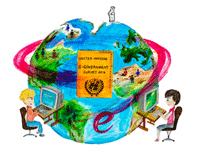 The Fifth Session of the Open Ended Working Group on Ageing will be held in New York from 30 July to 1 August.
The Fifth Session of the Open Ended Working Group on Ageing will be held in New York from 30 July to 1 August.
The Working Group was established by the General Assembly on 21 December 2010. In the context of the Open Ended Working Group, Member States, Civil Society Representatives and experts consider the existing international framework of the human rights of older persons, identify possible gaps and review how best to address them, including by considering the feasibility of further instruments and measures.
The upcoming Fifth Session of the Open Ended Working Group on Ageing includes four panel discussions which pay attention to the Human Rights and Care of Older Persons; Violence and Abuse against Older Persons (with a focus on older women and financial abuse); the Planning for End of Life Care: Legal and Financial issues; as well as Recent Developments and how to strengthen the rights of older persons through enhanced implementation of the Madrid International Plan of Action on Ageing.
Furthermore, the newly Human Rights Council appointed Independent Expert on the Enjoyment of All Human Rights by Older persons, Ms. Rosita Kornfeld-Matte will address the working group for the first time, and the Special Advisor of the Secretary General on Post-2015 Development will address the Working Group on the theme “Older Persons and the Post-2015 Agenda”. A number of side events are organized in cooperation with concerned stakeholders.
The event will be broadcast live via UN Web TV, providing access to the speeches, debates and discussions during the session. Updates will also be shared via Twitter from @UN_Ageing using #OEWG5.
For more information: Open-ended Working Group on Ageing
 UN DESA’s Statistics Division is organizing the Fourth Session of the United Nations Committee of Experts on Global Geospatial Information Management (UN-GGIM), to be held in New York on 6-8 August.
UN DESA’s Statistics Division is organizing the Fourth Session of the United Nations Committee of Experts on Global Geospatial Information Management (UN-GGIM), to be held in New York on 6-8 August.
As a formal inter-governmental mechanism, UN-GGIM is playing a leading role in setting the agenda and direction for the development of global geospatial information and in promoting its use to address key global challenges.
The purpose of the session is to provide a forum to liaise and coordinate among Member States, and between Member States, international organizations and other stakeholders for the provision of authoritative, reliable and maintained geospatial information in support of evidence-based decision making and sustainable development.
This session of the UN-GGIM will be held in conjunction with the Global Forum on the Integration of Statistical and Geospatial Information on 4-5 August. Convened in accordance with the Statistical Commission decision 44/101 and UN-GGIM decision 3/107, the Global Forum will bring together senior leaders from both statistical and geospatial communities to discuss the strategic vision and goals for the integration of statistical and geospatial information.
For more information: UN Committee of Experts on Global Geospatial Information Management (UN-GGIM)
 Governments across the globe are undertaking a process of transformative change. E-Government is becoming a holistic process to transform government towards sustainable development. This transformative change entail not only the design and implementation of innovative practices, but more fundamentally a transformation of government’s roles, functions, institutional frameworks and processes.
Governments across the globe are undertaking a process of transformative change. E-Government is becoming a holistic process to transform government towards sustainable development. This transformative change entail not only the design and implementation of innovative practices, but more fundamentally a transformation of government’s roles, functions, institutional frameworks and processes.
In his masterly article “Trend is not Destiny”, the French scientist Rene Dubos (1901- 1982) warned us about the importance of shaping technology to serve human needs and not the other way round. In other words, human beings should not become blind consumers of the latest technological fad or buzz words. Indeed, trend is not destiny, particularly when it comes to the use of technology to improve public service delivery worldwide.
Improving public service delivery has significant social, economic and environmental implications for all 193 countries worldwide. For instance, the U.N. e-Government Survey 2014 shows that, at the regional level, Europe continued to lead e-Government worldwide, followed by the Americas, Asia, Oceania and Africa. According to Eurostat, Europe spent in 2013 an average of 49.1 % of national GDPs in public service delivery. The importance of an activity demanding investments of approximately half of all European countries’ GDPs is self-evident. In addition, the Survey shows that e-Government can contribute towards transparency, efficiency, participation, while making service delivery more effective thus enhancing trust in Government.
Nevertheless, one of the most important trends is that Governments across the globe are undertaking a process of transformative change. E-Government is becoming a holistic process to transform government towards sustainable development. This transformative change entail not only the design and implementation of innovative practices, but more fundamentally a transformation of government’s roles, functions, institutional frameworks and processes.
In addition, the U.N. e-Government Survey 2014 shows that between 2012 and 2014, the number of countries offering mobile apps and mobile portals doubled to nearly 50 countries. Today, 118 countries use some form of social media. In terms of transparency, 46 countries have dedicated portals for Open Government Data, while 130 countries already partially publish government expenditures online. In terms of e-Consultation, 49% of countries provide a facility for obtaining feedback from citizens regarding the improvement of service delivery, while 75 countries place their e-Participation policy online. In 2014, all countries have an online presence for the first time in History, while 73 countries offer a “One-Stop-Shop” portal. More than half of the United Nations Member States are providing links to e-procurement platforms or announcements for bidding processes on their national portals. On the other hand, an estimated 1.1 billion households worldwide are still not connected to the Internet.
Effective regional cooperation will help support exchange programs and advance e-government development. For example: European Union, African Union’s Programme for Infrastructure Development, and the Centre for Innovation on e-Government Development in partnership with the UN in Colombia, among other examples.
Trends: Not Just DATA, but DEEDS
The challenge of sustainability is to balance social justice, economic output and environmental preservation. E-Government can become a tool to enhance sustainability prospects by promoting social inclusion, optimizing investments and expenditures and offering options to plan and monitor environmental threats. The world in 2025 will not be very different from the world today, but as social contrasts increase in some regions, it would be a big mistake to place all our eggs in specific high-tech baskets. E-Government is not only about technology and data, but about deeds. In the future, there will be no difference between e-Government and Government, as technology is gradually mainstreamed. As mentioned by Clay Sharky, “solutions only become socially interesting after they are technologically boring”, i.e. when used by nearly everybody.
To translate e-Government into social success it will always be important to continue balancing education, technology and the way in which governments present themselves online. Today, the most advanced countries in e-Government development show good results in the following current trends and these are not likely to fade away.
1) Whole-of-Government – Governments presenting themselves in an integrated way
2) E-participation – Governments engaging citizens at three levels: information exchange, consultation and actual decision-making.
3) Multichannel Service Delivery – Governments using not only computers but also cell phones, mail, personal attention and telephones to serve citizens better.
4) Expansion of Use – Citizens actually using e-services in a demand-driven way and not just having Governments increasing the supply of information that citizens do not use.
5) Digital gap and Vulnerable Groups – attention to increasing access to technology and engagement of all groups, including visually impaired, illiterate, elderly, youth and others.
6) Open Government – not only placing raw data online, but also having a comprehensive policy to open governments to citizens in an informative and participatory way, thus reducing corruption and increasing transparency.
Concrete Results – The Real Leap Towards the Future
For e-Government to fully achieve its potential, it will be important, first of all, to have capacity on the part of the civil service to separate technology from the marketing of technology. Everybody likes to be considered “smart” and nobody likes to be considered stupid. Quite often governments acquire “smart” technologies that they do not need, hoping that data and high-tech would by themselves solve all their problems. In addition, many governments face the challenge of institutional coordination, when different institutions within the same Government engage in a technological race, each one going in a separate way. Cooperate with the private sector is extremely important, but in a coordinated way.
The most advanced Governments have made a political decision, at the highest possible level, that transversal institutional coordination and a commitment to a longer-term plan are fundamental steps. It is essential to establish longer-term goals that go beyond the duration of political mandates, so that the country benefits as a whole from the potential of e-Government. The most advanced countries have a Chief Information Officer (CIO), or equivalent, working closely with the Office of the President or Prime Minister. In addition, they are coordinating their national development strategies with their e-Government strategies, such as in most European countries, Australia, New Zealand, Colombia, Uruguay, and most recently in Ecuador and others.
Concerning the way Government presents themselves online as a whole, Australia has a combined central portal, the United Kingdom has recently integrated its Directgov and Business Link portals into one. The Swedish business registration portal where three government agencies—the Swedish Companies Registration Office, the Swedish Tax Agency and the Swedish Agency for Economic and Regional Growth, have joined forces to enable entrepreneurs to logon and conduct services with all three agencies in one place. In Denmark the citizen portal offers a personalized account of information and services through a single sign-on. New Zealand and Singapore are moving ahead with an “all-of-government” approach that includes cloud computing. In the Philippines, gender and development mainstreaming efforts led to the creation of the Davao Medical Centre, which, in turn, set up the Women and Children Protection Unit (WCPU)—a one-stop family crisis intervention centre, which provides legal, psychiatric and medical services to its patients. The South Korea’s Integrated Financial Management Information System established by the Ministry of Strategy and Finance is another example of whole-of-government approach. In summary, the future of e-Government is not being defined by imaginative strokes of science fiction but by concrete deeds being performed everyday by the most developed governments.
In fact, there is a myth that public administration improves because of development. After 30 years working with development, I must contend that the opposite is true: without a serious reform to improve its public service, a country will not develop.
Governments that ignore the potential for change within their own administrations are condemned to perpetuate mistakes of the past. In this regard, e-Government – when properly used – can become the backbone of catalytic public reform towards a better future in all countries.
For more information:
UN DESA’s Division for Public Administration and Development Management
 The Fifth Session of the Open Ended Working Group on Ageing will be held in New York from 30 July to 1 August.
The Fifth Session of the Open Ended Working Group on Ageing will be held in New York from 30 July to 1 August.

